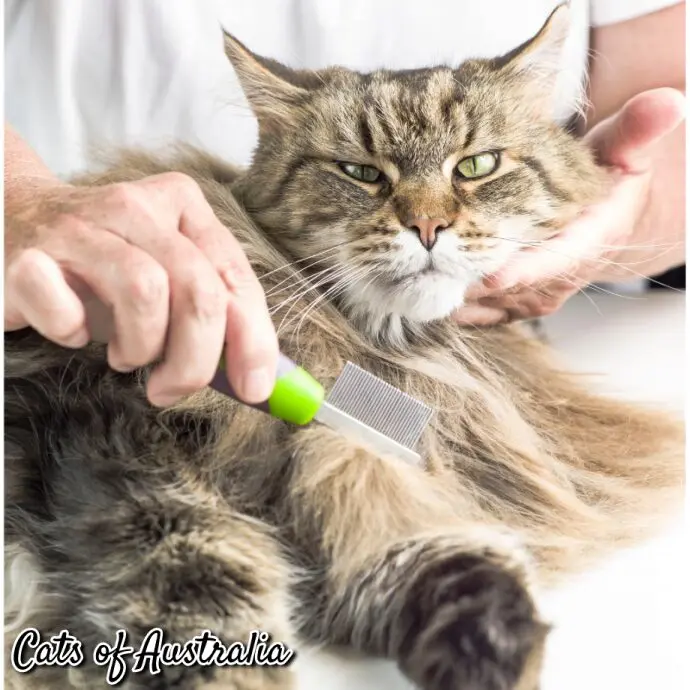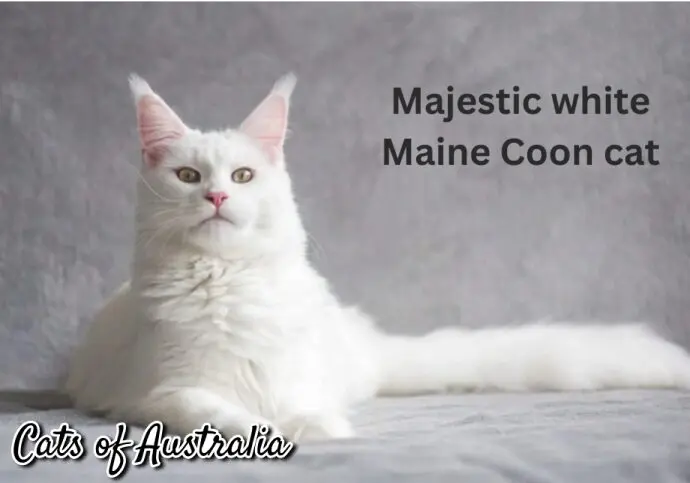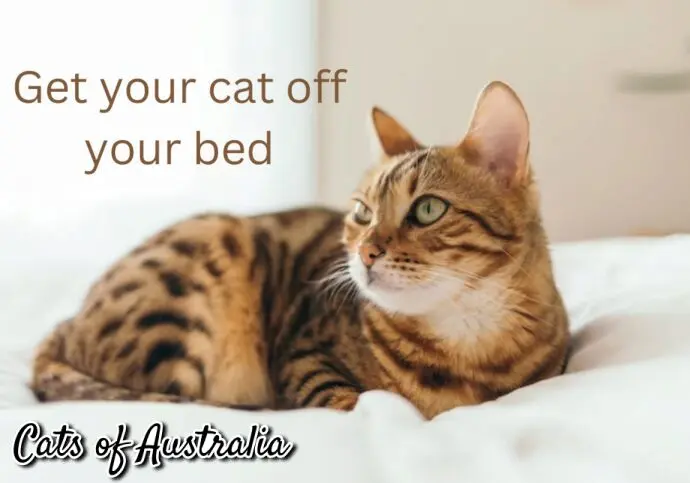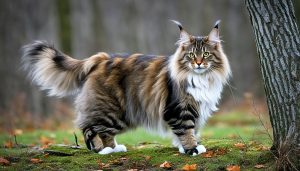- Dander(looseskin)
- Saliva
- Urine
“}},{“@type”:”Question”,”name”:”HowcanItellifI’mallergictoMaineCoons?”,”acceptedAnswer”:{“@type”:”Answer”,”text”:”TocheckwhetheryouareallergictoMaineCoons,spendtimewithoneorvisitapathologicalclinicforanallergytest.”}},{“@type”:”Question”,”name”:”WhyaresomepeopleallergictoMaineCoons,andsomearen’t?”,”acceptedAnswer”:{“@type”:”Answer”,”text”:”SomepeopleareallergictoMaineCooncats,whileothersarenotbecausethesensitivityofpeople’simmunesystemsisdifferent.Peoplewithover-sensitiveimmunesystemsareallergictoCooncats,whilethosewithproperlyfunctioningimmunesystemsaren’t.”}},{“@type”:”Question”,”name”:”Whatsymptomswillacatallergysuffererdisplay?”,”acceptedAnswer”:{“@type”:”Answer”,”text”:”
- Sneezing
- Coughing
- Redanditchyeyes
- Wateryeyes
- Runny,stuffy,anditchynose
- Hives
- Wheezing
- Shortnessofbreath
“}},{“@type”:”Question”,”name”:”WhatarethemostcommonMaineCoonallergysymptoms?”,”acceptedAnswer”:{“@type”:”Answer”,”text”:”
- Sneezingandcoughing
- Reditchyeyes
- Runnynoseandnasalcongestion
- Chesttightness,wheezing,andshortnessofbreath
- Redness,itchiness,orswellingwherethecatcomesincontactwiththeskin
“}},{“@type”:”Question”,”name”:”Shouldpeopleallergictocatsavoidcontactwiththisbreed?”,”acceptedAnswer”:{“@type”:”Answer”,”text”:”HavingcatallergiesdoesnotautomaticallypreventyoufromhavingaMaineCooncatorinteractingwithone.TherearedifferentwaystominimizecatallergiestoallowyoutointeractwithyourCooncatwithouthavingallergicreactions.Also,somepeoplebuildupatolerancetopetallergiesovertimebyconstantlyinteractingwiththepet.”}},{“@type”:”Question”,”name”:”HowtoreduceyourallergicreactionstoMaineCooncats?”,”acceptedAnswer”:{“@type”:”Answer”,”text”:”
- Brushyourcatregularly.
- Batheyourcat.
- Sethouselimitsforyourcat.
- Washyourhandsafterhandlingyourcat.
- Minimizetouchingyourcat.
- Stopyourcatfromlickingyou.
- Cleanyourhomeregularly.
- Useanti-allergensprays.
- Installairfilters.
- Usenosemaskswhenhandlingyourcat.
- Usegloveswhengardening.
- Keepyourcat’slitterboxclean.
- GetafemaleorneuteredmaleMainecoon.
- Useanti-allergymedication.
- Tryimmunotherapy.
“}}]}
Are Maine Coon Cats Hypoallergenic?
Maine Coon cats are not exactly hypoallergenic because they produce regular amounts of the allergy-inducing protein Fel d 1. However, they are more suitable for allergy sufferers than most other cats because they shed less. Plus, there are many ways to reduce allergic reactions to Coon cats.
Maine Coon cats are extremely popular amongst cat lovers. It’s easy to see why people love them. They are the largest cat breed, and they have very impressive fur. Their large build, ample silky hair, and affectionate nature make them good cuddle pets.
However, many people are allergic to cats. These people cannot be around cats without experiencing symptoms such as sneezing, nasal congestion, hives, etc.
As such, when thinking of adopting a Coon cat, it’s important to know if these pets are hypoallergenic (less likely to trigger an allergic reaction).
Are there cats that do not cause allergies? Do Maine Coon cats cause allergies? This article will answer these questions and more.
It’ll tell you everything you need to know about “Coon cat and cat allergies.” At the end of the article, you’ll know why Maine Moon cats may be good for allergy sufferers and how to reduce your allergic reaction to these cats.
Specifically, this discussion will cover the following:
- What causes cat allergies?
- Are there cats that do not cause allergies?
- What kind of allergens do cats like Maine Coons produce?
- What symptoms will a cat allergy sufferer display?
- Should people allergic to cats avoid contact with this breed?
- How to reduce your allergic reactions to Maine Coon cats
- Tips for living with a Coon cat if you are allergic
What causes cat allergies?
The primary cause of cat allergies is a protein called Fed d 1, which is secreted by cats and mainly found in their dander (dead skin cells), saliva, and urine.
Many people think that cat allergies are caused by cats’ fur. That’s a misconception that started because many people notice allergic reactions after stroking a cat’s fur.
However, in such cases, the fur is just a carrier and not the cause of the problem. The allergic reactions are caused by allergens (allergy-inducing substances) on the fur.
The three main cat allergens are dander, saliva, and urine.
These allergens cause allergic reactions because of the presence of a protein Fel d 1. So, when allergic to cats, you’re allergic to Fel d 1 protein, mainly found in cats’ dander, saliva, and urine.
Allergens spread easily across a cat’s body. Cats groom themselves regularly by licking their fur. The action smears their saliva (which is rich in Fel d 1) all over their fur.
When you stroke a cat’s fur, you come into contact with the Fel d 1 protein. If you’re sensitive to the protein, it’ll trigger allergic reactions. These allergens can stick to surfaces and become airborne. So, one can be affected just by inhaling air with these allergens.
Are there any cats that do not cause allergies?
All cat breeds cause allergies. To not cause allergies, a cat would have to be free of allergens. However, all cat breeds secrete the allergy-inducing Fel d 1 protein.
Whether long-haired, short-haired, or hairless, all cats secrete the Fel d 1 protein, which is behind the suffering of cat allergy victims. The protein is found in cats’ saliva, dander, and urine. So, it easily spreads across the body, sticks to surfaces, and becomes airborne.
However, some breeds are known to secrete lower levels of this protein, making them less likely to cause allergies. These include Sphynx and Devon Rex.
Are Maine Coons hypoallergenic?
To be considered hypoallergenic, a cat breed must produce “less than usual” levels of allergy-inducing Fel d 1 proteins. However, Maine Coon cats produce regular amounts of these proteins, so they are not less likely to trigger allergic reactions.
However, compared to other cat breeds, Maine Coons shed fur moderately.
When cats start shedding, they’ll leave fur all over the place, spreading allergens trapped on the fur. Since Maine Coon cats shed less, their owners are less likely to come into contact with allergens.
Thus, though Coon cats are not hypoallergenic, they are better suited to allergy sufferers than many other cat breeds.
What kind of allergens do cats like Maine Coons produce?
The three main allergies of Maine Coon cats are:
- Dander (loose skin)
- Saliva
- Urine
These substances have the Fel d 1 protein, which triggers allergic reactions in some people.
How can I tell if I’m allergic to Maine Coons?
To check whether you are allergic to Maine Coons, spend time with one or visit a pathological clinic for an allergy test.
Spend time with a Maine Coon
You are not allergic to Maine Coons if time with the cat does not trigger any allergic reaction from you.
You don’t have to buy a Maine Coon cat for this “trial.” Simply visit a friend who has a Maine Coon, then play with the cat. Alternatively, you can visit a shelter or a breeder and interact with their Maine Coons.
Do an allergy test
If you are not a fan of DIYs, a clinical allergy test is the best way to determine if you’re allergic to the Maine Coons. Simply visit a pathology lab for the test.
The test usually involves placing a small amount of an appropriate allergen on your skin and checking for a reaction.
Why are some people allergic to Maine Coons, and some aren’t?
Some people are allergic to Maine Coon cats, while others are not because the sensitivity of people’s immune systems is different. People with over-sensitive immune systems are allergic to Coon cats, while those with properly functioning immune systems aren’t.
Allergy sufferers have immune systems that overreact to substances that are usually harmless.
When the person is exposed to the substance, their immune system perceives it as dangerous and produces antibodies to fight it. This cause a reaction that leads to the release of chemicals that trigger allergic reactions.
For example, when people allergic to Maine Coons interact with the cat, they come in contact with cat allergens. Then their over-sensitive immune system produces Immunoglobin E (IgE) to fight the perceived threat.
The allergen combines with IgE and produces chemicals, including histamine. This chemical instructs the nose lining to produce more mucous, causing nasal congestion.
Generally, the more sensitive a person’s immune system, the faster they’ll show allergic reactions. Highly sensitive people react immediately they come in contact with an allergen. But less sensitive people react after a few hours.
However, when people with properly functioning immune systems interact with the Maine Coons, their immune systems do not kick in to produce antibodies. Thus, there is no release of chemicals that trigger allergic reactions.
What symptoms will a cat allergy sufferer display?
Common cat allergy symptoms include the following:
- Sneezing
- Coughing
- Red and itchy eyes
- Watery eyes
- Runny, stuffy, and itchy nose
- Hives
- Wheezing
- Shortness of breath
What are the most common Maine Coon allergy symptoms?
Maine Coon cat allergies are no different from other cat allergies. If you are allergic to Maine Coon cats, you are likely to have symptoms that include:
- Sneezing and coughing
- Red itchy eyes
- Runny nose and nasal congestion
- Chest tightness, wheezing, and shortness of breath
- Redness, itchiness, or swelling where the cat comes in contact with the skin
Should people allergic to cats avoid contact with this breed?
Having cat allergies does not automatically prevent you from having a Maine Coon cat or interacting with one.
There are different ways to minimize cat allergies to allow you to interact with your Coon cat without having allergic reactions. Also, some people build up a tolerance to pet allergies over time by constantly interacting with the pet.
How to reduce your allergic reactions to Maine Coon cats
There are different strategies you can use to minimize allergic reactions to Maine Coon cats. These include:
- Brush your cat regularly.
- Bathe your cat.
- Set house limits for your cat.
- Wash your hands after handling your cat.
- Minimize touching your cat.
- Stop your cat from licking you.
- Clean your home regularly.
- Use anti-allergen sprays.
- Install air filters.
- Use nose masks when handling your cat.
- Use gloves when gardening.
- Keep your cat’s litter box clean.
- Get a female or neutered male Maine coon.
- Use anti-allergy medication.
- Try immunotherapy.
Brush your cat regularly
Maine Coon cats have long hair that requires regular brushing to prevent matting.
Importantly, brushing helps remove cat dander from your Maine Coon’s fur. This prevents the allergens from spreading everywhere as your cat plays around.
Bathe your cat
Bathing is an essential part of grooming your feline friend. Importantly, bathing removes allergens from their body. Bathing a cat removes loose dander trapped in its fur. It also removes saliva from the cat’s fur.
Remember that a cat grooms itself by licking its fur. The action leaves saliva all over its body. A good bath washes off cat saliva. While a full-on bath in the tub is the best, you may also use gentle pet wipes.
Set house limits for your cat
Allergens on cats’ fur will transfer to areas the cat comes into contact with. So, allowing your cat on your bed will leave allergens on your sheets and pillows, where they can easily come into contact with your body and trigger allergic reactions.
Thus, to reduce pet allergies, you should train your Coon cat to stay away from certain areas like bedrooms.
Wash your hands after handling your cat
The COVID pandemic drummed home the importance of washing our hands regularly.
Washing your hands after handling your cat is one way to reduce cat allergies. Whenever you pet or groom your cat, allergens (dander and saliva) on its body transfer to your hands.
Washing your hands prevents the transference of allergens to other parts of your body and all over your home. After handling your cat, never touch your face before you’ve washed your hands. Wash your hands for at least 30 seconds with soap and running water.

Minimize touching your cat
Maine Coon lovers know that the cat breeds love cuddles. While petting a cat facilitates bonding, it also transfers allergens.
As you stroke your cat, the allergens on its body transfer to your hands, from where they can easily get to your face and trigger allergic reactions.
Minimizing touching your cat reduces your exposure to cat allergens. This reduces your chances of an allergic reaction.

Stop your cat from licking you
Maine Coon cats do not stop at grooming themselves. They also love grooming their owners. Thus, you’ll find your Coon cat licking you from time to time.
However, licking you will leave cat saliva (with the allergy-inducing Fel d 1 protein) on your body. Stopping your cat from licking you reduces your exposure to allergens.
Clean your home regularly
As your Coon cat runs around in your home, allergens on its body spread all over the place (floors, sofas, walls, etc.). So, even when you minimize touching your cat, you can come into contact with cat allergies from these surfaces.
Constantly cleaning your home reduces the number of cat allergens on surfaces.
So to reduce allergic reactions to your Coon cat, keep your home as allergen-free as possible.
Use anti-allergen sprays
If constantly cleaning your home will be too much work, consider using sprays that neutralize allergens.
Pet stores sell anti-allergen sprays that neutralize pet dander, cat saliva, and other allergens. Simply get one of these products and spray your home surfaces with it.

Install air filters
Cat allergens can become airborne and cause allergic reactions when sensitive people inhale them. So, cleaning surfaces around your home may not be enough, as these allergens will remain in the air.
Using air purifiers will ensure complete in-home protection. Products like HEPA air filters can clean the air in your home, ensuring you inhale allergen-free air.
Use nose masks when handling your cat
If you cannot install air purifiers, use nose masks to protect yourself from airborne allergens. Use the masks when handling your cat.

Good times to use a nose mask include:
- Grooming (brushing or bathing) your cat
- Emptying your cat’s litter box
- Cleaning your home
Use gloves when gardening
Cats often urinate in gardens. Cat’s urine is another main carrier of protein Fel d 1.
So, you risk coming into contact with potent cat allergens when gardening. A simple way to minimize the risk is to wear gloves when gardening.

Keep your cat’s litter box clean
Every time your cat uses its designated litter box, allergy-inducing Fel d 1 is released into the atmosphere. The allergen can become airborne and spread around. So, it’s best to clean it out as soon as possible.
Don’t stop at choosing the right litter box for your cat. Ensure it is always clean. Scoop out waste as often as you can, at least once daily. Then clean the litter box with soap and hot water weekly.
Get a female or neutered male Maine coon
Female Main Coons produce less amounts of protein Fel d 1 than males. This means female Coon cats are less likely to cause allergic reactions.
The production of Fel d 1 is linked to the presence of the male sex hormone. Thus, neutered males also produce less allergy-inducing protein than regular males.
Thus, you are less likely to have allergic symptoms with a female or neutered male coon cat.
Use anti-allergy medication
Using prescribed anti-allergy medication reduces allergenic reactions when interacting with Moon cats. Antihistamines are common anti-allergy medications.
Try immunotherapy
Instead of always taking anti-allergy medication, you may consider a therapy that helps you build up resistance.
Your doctor may recommend immunotherapy to help boost or change how your immune system works. It involves taking regular shots of injections (over several months) to help you gradually build resistance.
Takeaway
- Cat allergies are caused by the protein Fel d 1, which is present in the cat’s dander, saliva, and urine.
- All cat breeds cause allergies because all cat breeds secrete the allergy-inducing Fel d 1 protein.
- However, some cats produce less of the Fel d 1, making them hypoallergenic (less likely to trigger allergic reactions).
- Maine Coon cats are not exactly hypoallergenic, as they produce regular amounts of the allergy-inducing protein Fel d 1.
- Coon cat allergy symptoms include a runny nose, irritation of the throat, watery eyes, itchy skin, and more.
- While Maine Coons may not be the most hypoallergenic cat breed, they shed less. This makes them more suitable for allergy sufferers than many other cat breeds.
- Being allergic to cats does not mean you should avoid the Coon cat, as there are different ways to reduce allergic reactions to the cat.
The fifteen (15) tips outlined in the article will help you reduce allergic reactions and help you live with your Coon cat without trouble.
Want to know more about cats? Cats of Australia is the ultimate cat hub.
Are you looking for Maine Coon breeders in Australia but unsure where to find the right one? Our roster of registered breeders will help you find the cat that is right for you. Our resources will teach you everything you need to know about your furry friends, from their personalities to their living needs.
Want a furry friend and a stress-free life together? Contact Cats of Australia and let us help you.










